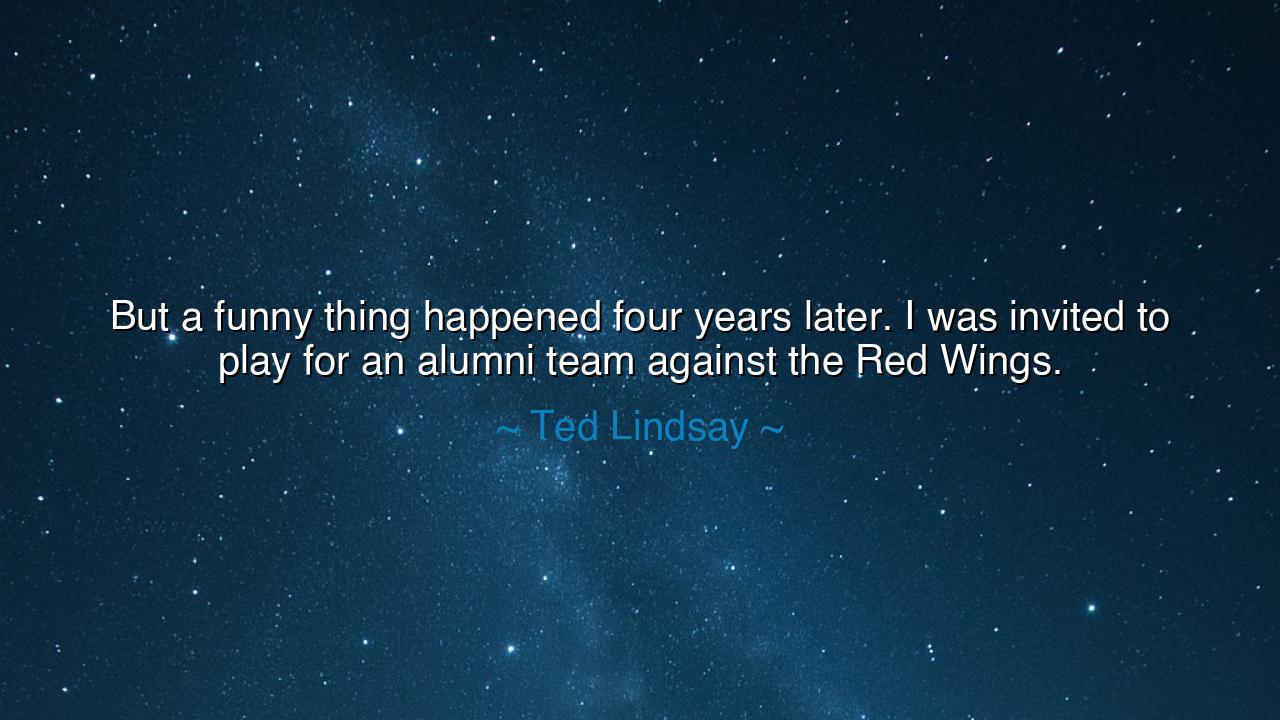
But a funny thing happened four years later. I was invited to
But a funny thing happened four years later. I was invited to play for an alumni team against the Red Wings.






“But a funny thing happened four years later. I was invited to play for an alumni team against the Red Wings.” — thus spoke Ted Lindsay, the fierce and fearless legend of hockey, whose spirit burned with the fire of competition and the quiet grace of redemption. At first, his words seem simple, almost casual — a reminiscence of a game, a return to the ice. Yet beneath their surface lies the deep current of forgiveness, time, and the unending bond between a warrior and his field of battle. For what is this “funny thing,” if not life itself, weaving irony into destiny and giving back, in gentleness, what once was taken in struggle?
Ted Lindsay, known as “Terrible Ted,” was not merely a player — he was a fighter, a leader, a man who helped forge the Players’ Association that changed the very structure of his sport. His courage on the ice was matched by his courage off it, but such courage often bears a cost. There were years of estrangement, of anger and pride, when the very team he helped elevate turned from him. Yet in his later years came this invitation — a call not merely to play again, but to reconcile. When he says, “A funny thing happened four years later,” it is the humble way of a hero saying: life, in its mysterious rhythm, finds its way back to healing.
The ancients knew this truth well — that time, the great physician, can mend even the deepest wounds of the heart. They told stories of exiled kings and fallen heroes who, after years of distance, returned to their homeland not in anger but in peace. The Greek Odysseus, after his long wandering, stood again upon the shores of Ithaca — older, wiser, no longer a conqueror but a man who understood that home is not won by might but by endurance. So too, Ted Lindsay’s story mirrors this sacred cycle of return. The ice he once ruled as a warrior now welcomed him back as a sage. The same rink that echoed with battle now rang with laughter.
When Lindsay calls it a “funny thing,” his humor is not jest but humility. It is the laughter of one who has learned that life rarely unfolds as we expect. What once seems like an ending becomes a beginning; what once feels like loss becomes renewal. The ancient poets would have called this the divine irony of fate — that the very paths we flee may one day lead us home. Through time’s gentle turning, the sharp edges of conflict are softened, and what remains is gratitude — the recognition that even struggle has meaning, and that the heart, once hardened, can be made tender again.
There is also a deeper lesson within his story — that of reconciliation and legacy. True greatness, the ancients taught, is not measured only in victory, but in the ability to return to one’s past with peace. Lindsay’s life teaches that to fight for what is right, as he did for his fellow players, may bring isolation in the moment, but respect in the end. When he was finally invited back to play, it was not just his stick that returned to the ice — it was his spirit, vindicated and free. Thus his “funny thing” was, in truth, a triumph, cloaked in simplicity.
Consider this in your own life: how often do we part from something — a dream, a place, a person — thinking the separation final, only for life to circle back with quiet grace? The ancients called this the wheel of fortune, ever turning, reminding us that nothing stays broken forever if the heart remains open. Lindsay’s story urges us to trust that the bridges burned by anger may yet be rebuilt by time, and that even the fiercest competitors can, one day, stand again as friends upon the same ground.
So let this teaching be passed down: Do not despair in endings, for life is a circle, not a line. When you walk away in pain, walk with dignity; when time passes, let it soften you, not harden you. For the day may come — perhaps years later, perhaps in ways you do not expect — when life will call you back to the arena, not to fight, but to celebrate. And in that moment, like Ted Lindsay, you will smile and say, “A funny thing happened…” knowing that what once felt final was, in truth, a beginning reborn.






AAdministratorAdministrator
Welcome, honored guests. Please leave a comment, we will respond soon